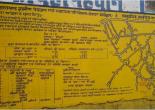- Skip to main content
- Skip to navigation
- Screen Reader Access
- Text Size
- Select Theme Default Theme Yellow Theme Pink Theme Blue Theme
- हिंदी में
- Home
- WSSO
Water & Sanitation Support Organization (WSSO)
The Guidelines for implementation of NRDWP further provide that each State should set up a properly staffed WSSO under the SWSM. Therefore, the State Government vide GO No. 77/ 29(1)/2012-(01Pey.)/01 dated 2nd February, 2012 has established WSSO in the State. The main functions of WSSO include: (i) to act as a facilitating agency (ii) to act as a bridge between the sector institutions and the Community Organizations, assisting the PRIs and VWSCs to prepare water security plan and plan, implement and maintain RWS projects based on the water security plan; (iii) Take up Human Resource Development (HRD) and Information Education Communication (IEC) activities through Communication & Capacity Development Unit (CCDU); (iv) Take up evaluation studies, impact assessment studies, R&D activities and share the findings with sector institutions for corrective action; and (v) Take up MIS and computerization programmes, GIS mapping and online monitoring systems, including those for water quality monitoring & surveillance.
CREDENTIALS OF WSSO
The State Govt. has designated Project Management Unit of World Bank assisted Uttarakhand Rural Water Supply & Sanitation Project (URWSSP) to perform the role of the WSSO as per GoI guidelines, including role of the earlier Communication and Capacity Development Unit (CCDU) with responsibility for IEC campaigns and building capacities. The Human Resource Development (HRD) Unit of the URWSSP has following features:
- Fully staffed by experts in social development, human resource development, communication, engineering, technical, environment and IT skills.
- Following training programs have been successfully conducted by the URWSSP:
Apex Level: State level trainings for elected representatives of the State (MLAs / representatives of Panchayat Raj Institutions (PRIs), policymakers and opinion makers including NGOs, has been conducted, with the aim of sensitizing them towards RWSS sector reforms.
Strategic Level: District level trainings for District Water & Sanitation Mission (DWSM), Zila Panchayat (ZP) and District Implementing Agencies (DIAs) for orientation and implementation needs, along with skill enhancement, motivational needs, experience sharing, team building and exposure to sector reforms and sector strengthening.
Intermediate: Capacity Building Program for PRIs and Support Organizations (SOs). The program covers capacity building of all field level functionaries working for facilitation of program on key areas of institutional arrangement, roles and responsibilities.
Grass root: Training and capacity building programs for Gram Panchayats (GPs), User Water & Sanitation Sub Committee (UWSSC) and communities through Non Government Organizations (NGOs) and DIAs.
General: Trainings for DIA officials, conducted by GOI, GoUK and other specialized agencies on sanitation, community led water supply scheme, monitoring, online system, Geographical Information System (GIS), planning & documentation etc.






